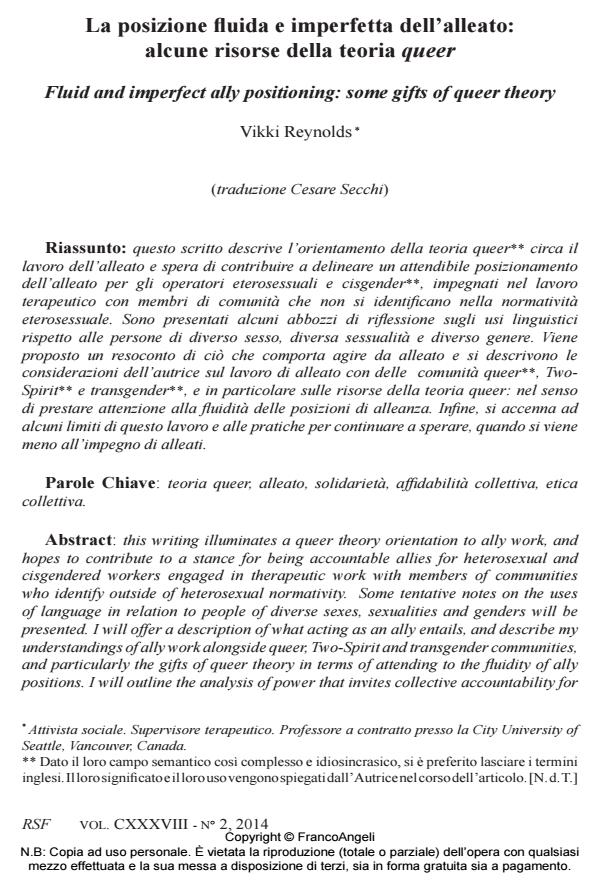Fluid and imperfect ally positioning: some gifts of queer theory
Journal title RIVISTA SPERIMENTALE DI FRENIATRIA
Author/s Vikki Reynolds
Publishing Year 2014 Issue 2014/2 Language Italian
Pages 15 P. 129-143 File size 1602 KB
DOI 10.3280/RSF2014-002009
DOI is like a bar code for intellectual property: to have more infomation
click here
Below, you can see the article first page
If you want to buy this article in PDF format, you can do it, following the instructions to buy download credits

FrancoAngeli is member of Publishers International Linking Association, Inc (PILA), a not-for-profit association which run the CrossRef service enabling links to and from online scholarly content.
This writing illuminates a queer theory orientation to ally work, and hopes to contribute to a stance for being accountable allies for heterosexual and cisgendered workers engaged in therapeutic work with members of communities who identify outside of heterosexual normativity. Some tentative notes on the uses of language in relation to people of diverse sexes, sexualities and genders will be presented. I will offer a description of what acting as an ally entails, and describe my understandings of ally work alongside queer, Two-Spirit and transgender communities, and particularly the gifts of queer theory in terms of attending to the fluidity of ally positions. I will outline the analysis of power that invites collective accountability for allies and the possibilities and hope that being imperfect allies offers. Finally I will describe some of the limitations of ally work, and practices for holding onto hope when we fail to be in line with our commitments to being allies.
Keywords: Queer theory, ally, solidarity, collective accountability, collective ethics.
- [1] Bishop A. Becoming an ally: Breaking the cycle of oppression. Halifax, Canada: Fernwood; 1994.
- [2] Fassinger R, Arsenau J. “I’d rather get wet than be under the umbrella”: Differentiating the experiences and identities of lesbian, gay, bisexual, and transgender people. In: Bieschke KJ, Perez RM, Debord KA, ed. Handbook of counseling and psychology with lesbian, gay, bisexual and transgender clients (2nd ed). Washington, DC: American Psychological Association; 2007, p. 19-50.
- [3] Munro A. Comunicazione personale; 2010.
- [4] Butler J. Gender trouble: Feminism and the subversion of identity. New York, NY: Routledge; 1990.
- [5] MacFarlane D. Comunicazione personale; 2009.
- [6] Kelly J. Comunicazione personale; 2010.
- [7] Nataf Z. Lesbians talk transgender. London, UK: Scarlet Press; 1996.
- [8] O’Brien-Teengs D. Two spirit women (2nd ed.). Retrieved from http://www.2spirits.com/; 2008.
- [9] Bornstein K. Gender outlaw: On men, women and the rest of us. New York, NY: Routledge; 1994.
- [10] Butler J. Excitable speech: A politics of the performative. New York, NY: Routledge; 1997.
- [11] Jagose A. Queer theory: An introduction. Melbourne, Australia: Melbourne University Press; 1996.
- [12] Queen C, Schimel L. Homosexuals: Challenging assumptions about gender and sexuality. San Francisco, CA: Cleis Press; 1997.
- [13] Robinson T. The convergence of race, ethnicity, and gender: Multiple identities in counseling (2nd ed.). Boston, MA: Pearson Education; 2005.
- [14] Day R. Gramsci is dead: Anarchist currents in the newest social movements. London: Pluto Press; 2005.
- [15] Crenshaw K. Mapping the margins: Intersectionality, identity politics, and violence against women of colour. In: Crenshaw K, Gotanda G, Peller G, Thomas K, ed. Critical race theory: The key writings that formed the movement. New York, NY: The New Press; 1995, p. 357-383.
- [16] Freire P. Pedagogy in process: The letters to Guinea Bissau. New York, NY: Seabury Press; 1978.
- [17] Lacey A. Spaces of justice: The social divine of global anti-capital activists’ sites of resistance. CRSA/RCSA 2005; 42(4): 407.
- [18] Reynolds V. Collective ethics as a path to resisting burnout. Insights: The Clinical Counsellor’s Magazine & News December 2009; 6-7.
- [19] McNamee S, Gergen K. Relational responsibility: Resources for sustainable dialogue. London, UK: Sage; 1999.
- [20] Tamasese K. Talking about culture and gender. In White C, ed. Working with the stories of women’s lives. Adelaide, Australia: Dulwich Centre; 2001, p.15-22.
- [21] Kvale S. Inter-views: An introduction to qualitative research interviewing. London, UK: Sage; 1996.
- [22] Tuhiwai Smith L. Decolonizing methodologies: Research and indigenous peoples. London, UK: Zed Books; 1999.
- [23] Lee S. (Producer/Writer/Director). Do the Right Thing (Motion Picture). United States: 40 Acres & A Mule Filmworks; 1989.
- [24] Freire P. Pedagogy of freedom: Ethics, democracy and civic courage. Lanham, MD: Rowman and Littlefield; 2001.
- [25] Peltier L. Prison writings: My life is my Sundance. New York, NY: St. Martin’s Press; 1999.
- [26] Reynolds V. Fluid and Imperfect Ally Positioning: Some Gifts of Queer Theory. Context, October 2010. Association for Family and Systemic Therapy, UK, 13-17.
Vikki Reynolds, La posizione fluida e imperfetta dell’alleato: alcune risorse della teoria queer in "RIVISTA SPERIMENTALE DI FRENIATRIA" 2/2014, pp 129-143, DOI: 10.3280/RSF2014-002009